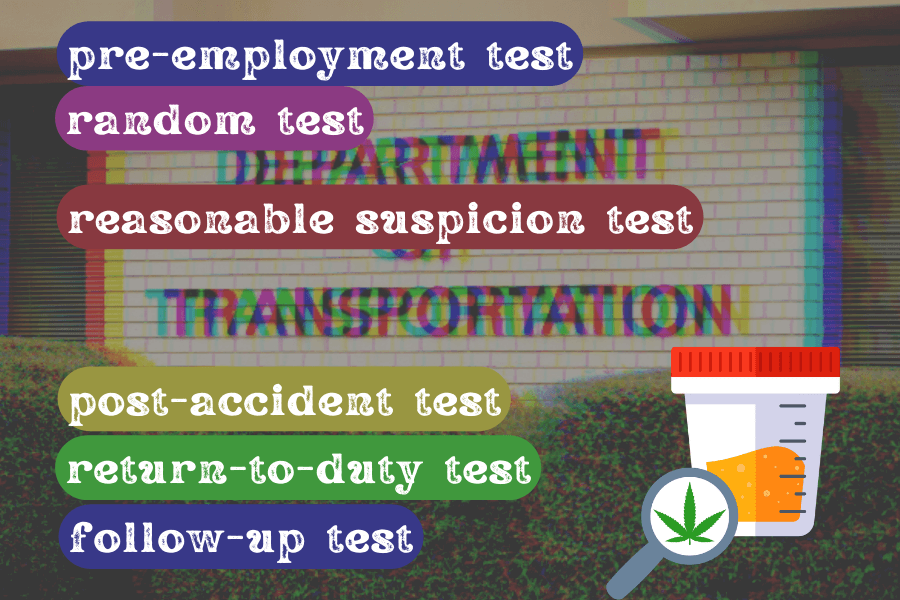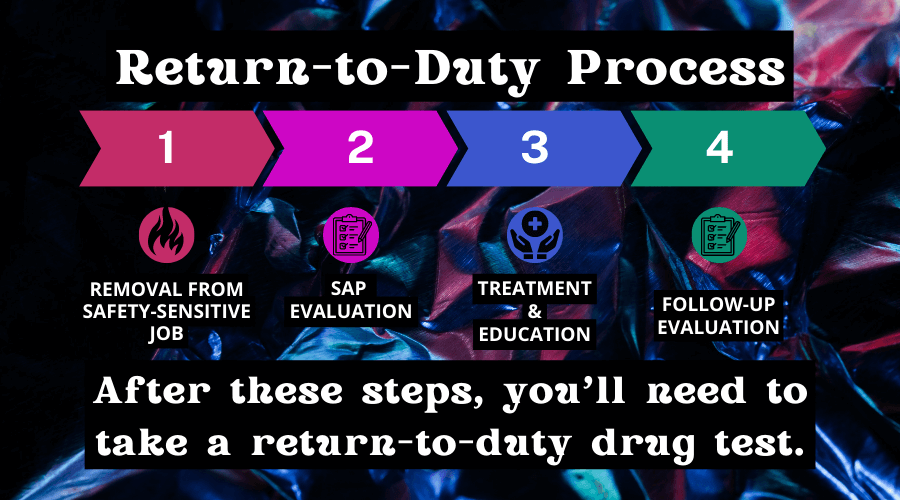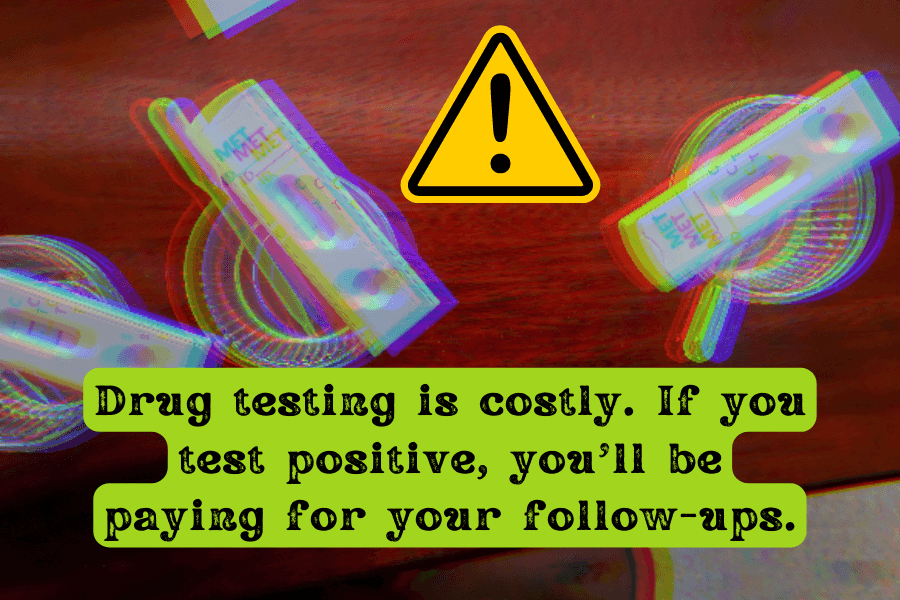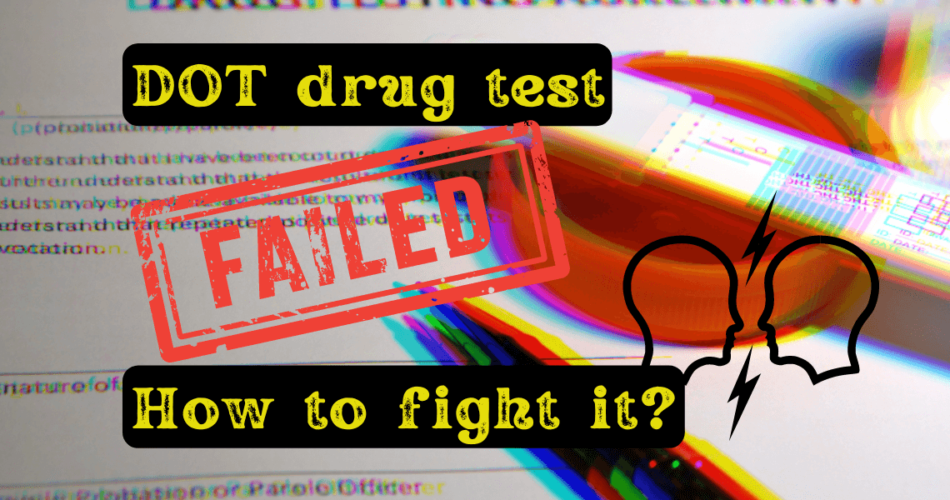How to fight a failed DOT drug test is a question we get often. Sometimes, test results are false positives, meaning you haven’t actually taken the drug but it is detected in your sample. Let’s discuss the return-to-duty process and whether you can avoid it.
TL;DR
- If you failed a DOT drug test, you need to go through a rehabilitation program and regular follow-up testing for the next 1–5 years 📝
- Unless the result was a false positive, there’s no way to fight it ❌
- If you hadn’t taken any drugs, even weeks earlier, you can ask for your sample to be re-tested ✔️
- If you’re taking medication that could’ve triggered the false positive, provide your prescription as proof ✔️
Types of DOT Drug Tests
CDL drivers might be subject to multiple DOT drug tests. Before you’re first permitted to operate a CMV, you must pass a pre-employment drug test. Once you’ve gotten your job, 50% of the employees will be tested throughout the year for drug use, and 10% will be tested for alcohol use. It’s these random drug tests that usually make truck drivers lose their jobs – since they’re unannounced, you can’t prepare for them.
In addition, drug and alcohol tests are done if:
- you’ve been in a crash that resulted in a human fatality, injury or serious damage to a vehicle;
- you seem to be under the influence;
- you’ve violated the DOT drug or alcohol regulations and completed a Return to Duty program (you’ll be subject to at least 12 months of follow-up testing).

How to fight a failed DOT drug test so it doesn’t keep you from working your job? After you’ve violated DOT drug and alcohol policies, there’s only one way to appease the Deparment of Transportation: the return-to-duty (RTD) process.
How to Remove a Failed Drug Test From the FMCSA Clearinghouse?
Your positive test result will stay on your FMCSA Clearinghouse record for 5 years, no matter how quickly you return to duty and how well you cooperate with your substance abuse professional (SAP). During that time, you’ll need to take many follow-up tests (at least 6 over the first 12 months following the positive result). Only if those drug test results are consistently negative will the blemish be removed from your record.
What Does the Return to Duty Process Look Like?
You might think that the DOT regulations are strict and that the RTD process takes a long time. Indeed, it might take weeks or months, depending on your situation, plus 1–5 years of follow-up testing once you’ve returned to your functions. Here are the steps:

- Removal from safety-sensitive functions: You’re immediately fired or moved to a position that doesn’t involve driving.
- Substance abuse professional (SAP) evaluation: You must consult with a DOT-qualified SAP, who will assess the extent of your substance abuse issue and recommend a treatment plan.
- Treatment and education: You must complete the program determined by the SAP.
- Follow-up SAP evaluation: The SAP must check if you’ve successfully completed the program and are ready to return to work.
- Return-to-duty test: You must pass a drug and/or alcohol test before being allowed to resume safety-sensitive functions.
- Follow-up testing: You’ll be subject to unannounced follow-up testing for a period determined by the SAP, typically ranging from 12 to 60 months.
So, how to fight a failed DOT drug test? You don’t really fight it – you comply with the requirements to get your job back. But if your original result was a false positive, there’s another route that we’ll discuss shortly.
What Can a Substance Abuse Professional (SAP) Make You Do?
If you’re wondering what can fall under the “treatment plan” and “education” an SAP can recommend, you need to know that the process can be costly. It will likely be a combination of drug rehabilitation therapy and educational classes that you’ll need to pay for out of your own pocket. Medical insurance doesn’t typically cover such expenses.
Real Story 💬
In 2020, a Reddit user wrote about their experience with the return-to-duty process on the Legal Advice subreddit. He used to be a heavy marijuana smoker but stopped before applying for a job that involved working on boats in Hawaii. Still, his first workplace drug test came back positive and he was immediately moved to a different position within the company.
After meeting with a SAP, he had to attend 4 therapy sessions (which was reduced to 3 sessions since he didn’t actually have a drug problem) and retake the test. The follow-up testing regimen turned out to be expensive, starting with 3 tests a month, $68 each. Remember, this fellow had smoked marijuana weeks before applying for his job! Yikes. If you’re curious about what happened next, give it a read.

How to Fight a Failed DOT Drug Test If It Was a False Positive?
Now, let’s go back to our original question: how to fight a failed DOT drug test if you hadn’t taken any drugs in the first place? A false positive can be triggered by food, medication, or even cosmetics. The Department of Transportation has guidelines in place for when this happens. The first thing you can do is demand a re-test. Your original sample will be tested again, using more advanced methods that better distinguish between drug metabolites and unrelated substances.
For your test result to be changed, you need to contact the company’s medical review officer (MRO). If you have a valid prescription for a medicine that may have triggered the false positive, show it to them. If you suspect it was food (such as poppy seeds), you can try to explain the situation to the officer, and they might be able to provide a legitimate medical explanation for your positive result.
Conclusion
The DOT drug testing regulations are strict for a reason. Truck drivers under the influence can make traveling extremely dangerous for other road users. So don’t be surprised if you need to go through a lengthy process with a SAP before hitting the road again. But how to fight a failed DOT drug test if it’s a false positive? A medical review officer can help you prove that you weren’t under the influence after all.
Similar Posts:
- What Happens If You Fail a Pre-Employment Drug Test?
- Does the Military Test for LSD? Drug Testing Policy According to the DoD
- Does CBD Show on DOT Drug Screen? (False Positive Drug Test Results)
- LSD on a Drug Test: How Long Does LSD Stay Detectable?
- Do Shrooms Show Up On a Drug Test? How Long Do Shrooms Stay in Your System? Find Out More About Psilocybin Mushrooms
- Half Life of LSD: How Long Does LSD (Half Dose) Stay in Your Bloodstream?
- How Long Does LSD Stay in Your System: A Full Guide





